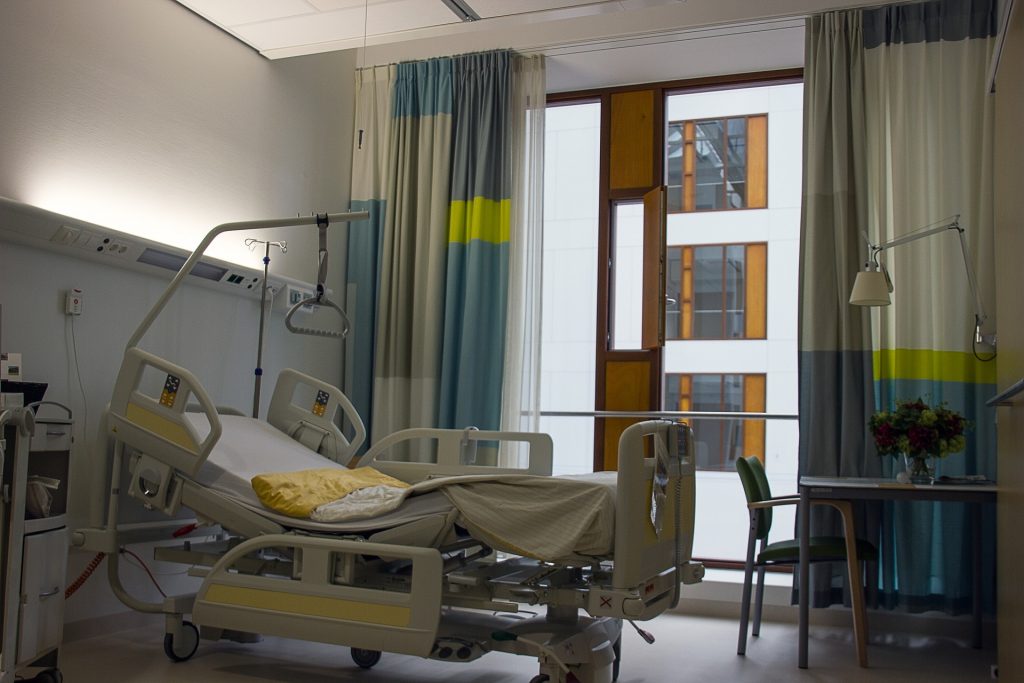American Man Goes to the ER in Taiwan, Reveals ‘the Horrors of Socialized Medicine’
As Americans, many of us have lived in fear of healthcare costs and consequently have become comfortable with avoiding seeking medical care unless it is a life-threatening emergency. American expatriate, Kevin Bozeat, feared for the when his sudden illness in Taiwan forced him to rush to an ER; however, his story could be a huge wake up call for the American healthcare system.
Bozeat shared a detailed account of his experience at a Taiwanese hospital in a Facebook post titled, “The Horrors of Socialized Medicine: A first hand experience” which has since been shared over 204,000 times.
In the post, Bozeat explains that he began experiencing stomach pains and sudden vomiting one day in February. While he hoped the vomi ting and pain would cease eventually, it became even worse and he was unable to drink water. By 3 a.m. he was suffering from intense stomach cramps and constant vomiting despite having an empty stomach and realized he had no choice but to rush to the emergency room.
“I wanted to avoid it,” he wrote, “I had no idea how different Taiwanese hospitals would be, whether I would be able to find an English speaking doctor, or what it would cost me (my US health insurance has lapsed and I don’t qualify for Taiwanese NHI).”

Foreigners can benefit from Taiwan’s National Health Insurance scheme (NHI), which covers every Taiwanese citizen’s healthcare and medical treatments, only after six months of living and working legally in the country. Unfortunately, Bozeat had not lived in Taiwan long enough to qualify at this point.
While his concerns regarding cost and quality of care are universal among many American citizens, he realized after the ordeal that he actually had nothing to worry about:
“My Taiwanese roommate called a taxi and took me to the ER at NTU Hospital. I was immediately checked-in by an English speaking nurse. Within 20 minutes I was given IV fluids and anti-emetics,” he wrote.
“They took blood tests and did an ultrasound to ensure it wasn’t gall stones or appendicitis. From there I was given a diagnosis: a particularly severe case of Acute Viral Gastroenteritis (aka the stomach flu).”
Under the care of these doctors, Bozeat made a quick recovery. He states, “after about 3 hours on an IV, I began to feel slightly better, my nausea disappeared and my stomach began to calm down. I was discharged with a prescription for anti-emetics and pain medication. Each day since I’ve gotten progressively better and am now pretty much back to normal.”

The biggest shock came when he received his bill. In the U.S. we’re used to headlines such as, “$12,000 for a bee sting? Emergency room visits get even pricier“ and “She didn’t get treated at the ER. But she got a $5,751 bill anyway.“ So, how much did Bozeat have to pay in Taiwan with no insurance?
“The bill for the ER visit?…US $80.00. Eighty. American. Dollars,” he wrote in his post.
“Out of pocket. Full cost. No discounts. No insurance. At one of the best hospitals in Taiwan. And if I had NHI, it would have been a fraction of that. This could have easily cost me hundreds or even thousands in the US without insurance. But here in Taiwan I was able to receive speedy, quality care comparable to what I would have gotten in a US hospital for relatively small amount of money.”
Following this positive experience, Bozeat concluded this post with a message for America, “given this experience, I no longer have a reason to fear or hesitate getting care in Taiwan should I ever need it. America, it’s time to stop making excuses.”
While the initial post was largely well-received, some took this opportunity to insult the Taiwanese healthcare system despite having no personal experiences and expressed their skepticism regarding the story. In response to these critics, Bozeat shared a follow-up post containing seven points directly responding to these comments:
“1: Yes, Taiwan has a noticeably cheaper cost of living than the US, healthcare included. However, Taiwan isn’t /that/ cheap. There are places in Southeast Asia, Latin America, Africa and Eastern Europe that are significantly cheaper than Taiwan
2: Taiwan is not a poor country by any measure. It’s GDP per capita is higher than Denmark, Austria and Canada
3: Yes, doctors make less here, but it’s still considered a respected middle class profession. And there seems to be no shortage of them.
4: Some people argued that exchange rates mean US$80 is a fortune for a Taiwanese person. No, you just have a poor understanding of numismatics. The exchange rate has nothing to do with the overall cost. Just because $1 Taiwan dollar is US 3¢ doesn’t mean I can live large here. $50 Taiwan dollars won’t even buy you a Big Mac.”

As he states, even when taking into consideration the difference of living costs in Taiwan vs the United States, it still does not account for the drastically different price tags.
An article from Upworthy pointed out that while the cost of living in Taiwan was roughly half that of living in the U.S., it is highly unlikely that you could pay just $160 for a visit to an American ER and the treatments you receive there.
“5: Yes, taxes pay for the healthcare here. No, they are not high. Try for yourself: The formula for the NHI monthly premium contribution for a single employed adult is:
[your monthly income] x 0.0469 (4.69%) x 0.3 (30%) = Your monthly out-of-pocket healthcare premium
6: It’s not perfect. Not everything is 100% covered. I had a good experience, but Im sure many people have had [non-financial] medical horror stories here.”
For those who are wondering, on a $50,000 annual salary, this would cost roughly $58.63 per month and on a $100,000 annual salary, it would cost $117.25 a month.
“7: This system exists because the Taiwanese government believes that healthcare is a right for all of its citizens, rather than a privilege for those who can afford it. Those aren’t my words, that’s what the Ministry of Health said in its English language brochure. Every Taiwanese citizen and foreign permanent resident is entitled to, and required to enroll in the National Health Insurance Program (NHI). Everyone is covered, regardless of employment status, no one is uninsured, no one ever goes bankrupt due to medical bills.”
In America, where citizens can go bankrupt over minor injuries and short visits to the ER (bee stings, minor concussions), our healthcare system looks more like a Black Mirror episode in comparison to the Taiwanese universal healthcare.
Just this week in the U.S., a woman in Florida went viral for her own ER horror story. She visited her local emergency room for precautionary measures after she was nipped on the finger by a stray cat she tried to feed. Worried about the possibility of rabies, she went to the ER where she received two types of injections and an antibiotic — she was never even given an opportunity to speak with a do ctor.
When the woman received the bill for her treatments, she was shocked to see that she and her insurance were being charged, $48,512. One rabies immune globulin injection accounted for $46,422 of that overall cost.

Bozeat was able to receive immediate emergency medical care at a fraction of what it would have cost in the U.S. without sacrificing any of the quality and ultimately, without insurance — while this may seem unattainable for Americans, this level of care is available in many countries around the world where universal healthcare is a reality.
“Taiwan is less wealthy than the US, yet it spends less and gets more out of its healthcare system. We see the same story repeat itself in every other developed nation. This debate is all so tiresome, because there is no debate. Universal healthcare works, it can be done here, it can be done in any country with sufficient resources. All we need is political will and an implementation plan,” Bozeat writes.
He concluded his second post with the following message, “pardon my French but, America, get your head out of your ass, and stop making excuses.”
The post American Man Goes to the ER in Taiwan, Reveals ‘the Horrors of Socialized Medicine’ appeared first on NextShark.
Contributer : NextShark



 Reviewed by mimisabreena
on
Friday, March 01, 2019
Rating:
Reviewed by mimisabreena
on
Friday, March 01, 2019
Rating:














No comments:
Post a Comment